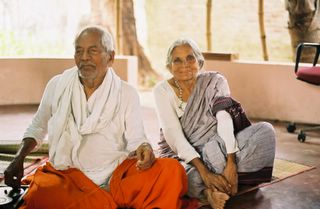Running Away from Home
But there was no school for her past the seventh standard, and she was relegated to carrying lunches on her head from the mudhut to the fields where her mother and, occasionally, father labored. One day, the lunch pail had the better of her and fell on the ground. Her father, drunk as was often his wont, beat her mercilessly. (To be fair, he was likely in the last stages of throat cancer, and in constant considerable pain.)
Her next older brother had already made plans to run away that same evening to Madurai, and she plead with him to take her with him. They had what might be considered the equivalent of a quarter between them, too little for busfare for both of them, so they set out at 10 a.m. the next morning, with Krishnammal hiding under the bus seat, first on a bus to Kodai Road, and then onto Madurai, the great city to which she had never been. Travel by Dalits was rare in those days (the late 1930s), and they were also much less likely to go on pilgrimages, since they were denied entry into the temples (universal access was only achieved in Tamil Nadu in 2007!)
Her brother had already found a place in a charity hostel and school for himself, but what to do with her? Since it was a boy’s hostel only, she slept outside by the gate, and the boys snuck out some food to her. For several days, they searched for a place for her, until she was admitted into a convent school. The food was poor, and English class impossible (“what was all this talk about comparatives and superlatives?” she still remembers she wanted to know.) But from day one, she was first in math, and with her already prodigious memory, committed wide swathes of the New Testament to memory, which pleased the convent director (though, to the latter’s dismay, she refused to remove the bindu, the sign of a female Hindu, from her forehead). Krishnammal would stay up all night working on her English lessons, until she stood first in the class at that as well. The main message that she received from her brush with Christianity was Jesus’ message to “Go into your closet and pray,” a practice Krishnammal has continued (sometimes for days at a time when the going gets rough) to this day.
At the end of term, the convent director took her to Dr. T. Soundaram (from a well-known industrialist family). Soundaram took Krishnammal under her wing, putting her in charge of her own hostel of Dalit children of the fourth and fifth standard; Krishnammal continued her practice of studying all night, and going to school and running the hostel by day, which set forever her immense capacities for work, which she maintains into her 80s.
Through an intermediary, her parents found both Krishnammal and her brother after three days, but by then they were resigned that other destinies awaited them. Her father was to die within a year, leaving 12 children, six of whom were to die in childhood.


0 Comments:
Post a Comment
<< Home